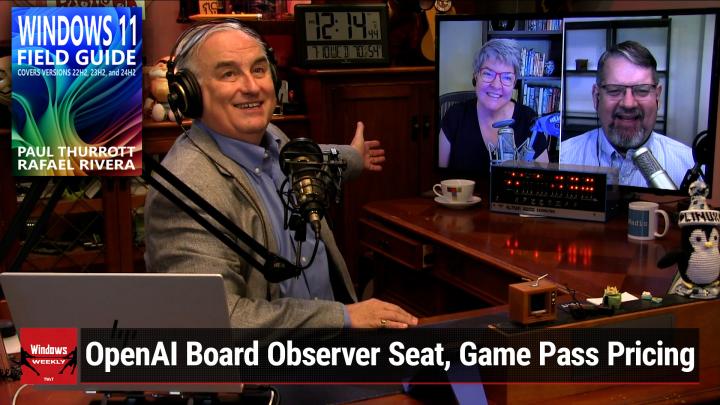The OpenAI Boardroom Shuffle
Created by AI, edited by humans.
In a surprising turn of events, OpenAI parted ways with Microsoft and Apple regarding their board seats. This development, discussed in depth on a recent episode of Windows Weekly, has sent ripples through the tech industry and raised questions about the future of AI partnerships and oversight.
Paul Thurrott, a longtime tech journalist and Windows expert, pointed out the peculiar timing of this decision. A week prior, Apple had secured a non-voting "observer seat" on OpenAI's board without any significant financial investment. This move mirrored Microsoft's position, which they obtained after a substantial $13 billion investment in the AI company.
The hosts speculated on the reasons behind this sudden change. Thurrott noted that regulatory bodies, including the EU, UK CMA, and US government agencies, had previously announced investigations into the Microsoft-OpenAI relationship. The concern was that their partnership might be structured to avoid antitrust scrutiny from an outright acquisition.
Thurrott mentioned that the EU had recently cleared the Microsoft-OpenAI partnership, stating it didn't break any laws. This makes the timing of OpenAI's decision even more intriguing.
Richard Campbell, co-host of the podcast and fellow Microsoft expert, suggested that the move might be linked to a potential restructuring of OpenAI. He pointed out that the company has been publishing revenue numbers despite being privately held, which could indicate positioning for a future public offering or significant structural changes.
The discussion also touched on OpenAI's changing nature. Campbell noted that many original AI researchers who joined OpenAI to work in the public interest have since left to start their own AI companies. This departure might pressure OpenAI to restructure in a way that allows for better talent retention through stock options and other financial incentives.
Thurrott and Campbell emphasized the rapid pace of AI development and its impact on the tech industry. They compared the current AI boom to other transformative moments in Silicon Valley history, noting that the speed of AI's advancement is unprecedented.
The hosts also speculated on the potential for collusion among big tech companies, given that Microsoft and Apple - two of the world's largest companies - had secured these observer seats. While acknowledging that such collusion would be challenging to prove, they raised questions about the concentration of influence in the AI sector.
Much of what's happening behind the scenes at OpenAI remains a mystery. This shake-up in the OpenAI boardroom highlights the complex interplay between technological advancement, corporate strategy, and regulatory oversight in the rapidly evolving AI landscape. As the situation continues to develop, it's clear that the implications for the future of AI governance and industry partnerships will be significant.
Be sure to listen to the complete episode of Windows Weekly to hear the full discussion and more in-depth analysis. The hosts' expertise and insider perspectives provide valuable insights into this developing story and its potential impact on the tech industry.
Subscribe to Club TWiT for even more tech coverage!
